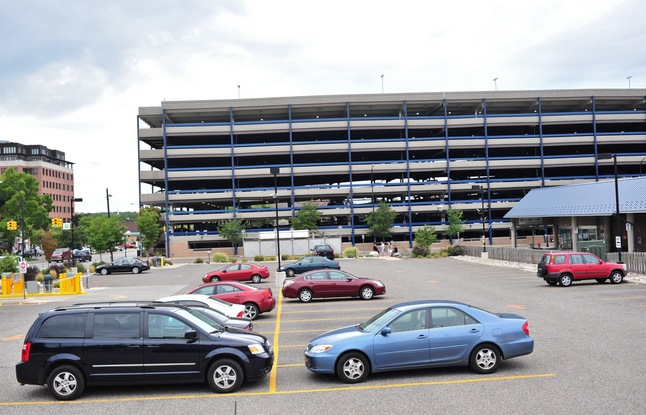Ann Arbor to put proceeds from sale of former YMCA property toward affordable housing

Proceeds from the sale of the Y Lot at Fifth and William, a city-owned property across from the downtown Ann Arbor library and next to the Blake Transit Center, will go toward affordable housing, which city officials think is fitting since 100 units of affordable housing stood on the site before the city purchased the property and demolished the building.
Ryan J. Stanton | AnnArbor.com
The policy makes a special exception for the former YMCA property at the corner of William and Fifth, which the city acquired in 2003 for about $3.5 million.
The city demolished the Y building, including 100 units of affordable housing on the site, and has been looking for a way to make up for the lost units ever since.
The new policy stipulates that net proceeds from the eventual sale of the so-called Y Lot, whenever that might be, first will be used to repay the various funds that expended resources on the property, after which any remaining proceeds will go to the city's affordable housing trust fund.

Sandi Smith, D-1st Ward, attended her last meeting as a City Council member Monday night.
Ryan J. Stanton | AnnArbor.com
For all other city-owned property, the policy states the City Council will determine on a case-by-case basis how to best use the proceeds from any future sales by considering all of the needs of the city at the time of sale, especially the need for affordable housing.
However, no less than 10 percent of net proceeds of any sale will be allocated and distributed to the affordable housing trust fund, according to the policy as amended.
Before agreeing to that policy, the council voted down a proposal from Council Member Sandi Smith that would have directed 85 percent of the net proceeds from future sales of all downtown city-owned properties toward affordable housing. Even when Council Member Margie Teall, D-4th Ward, offered an amendment to reduce it to 60 percent, it still didn't pass.
A majority of council members agreed they liked the intent of Smith's proposal, but they thought it was too restrictive and they wanted future councils to have more leeway than it offered.
Considering there are millions of dollars in deferred capital needs for the city's public housing, Smith said she feared relying on future councils to set aside discretionary money would barely put a dent in the problem. She said there needs to be a large infusion of money.
Shortly after midnight, toward the end of what was a five-hour meeting, council members went around the room thanking Smith for her service on council for the last four years. Monday's meeting was Smith's last as a council member since she won't be around for the council's next meeting.
Smith is stepping down and will be replaced next month by Sumi Kailasapathy, who defeated Eric Sturgis in the Democratic primary in August.
Mayor John Hieftje recently reappointed Smith to continue serving on the DDA's governing board through August 2016. She also is expected to stay involved with the city's North Main-Huron River Corridor Vision Task Force, which is looking at ways to improve the North Main corridor.
Council Member Stephen Kunselman was absent.
Ryan J. Stanton covers government and politics for AnnArbor.com. Reach him at ryanstanton@annarbor.com or 734-623-2529. You also can follow him on Twitter or subscribe to AnnArbor.com's email newsletters.


Comments
mady
Fri, Oct 19, 2012 : 2:44 p.m.
I am disheartened by the negative responses I am seeing to this article. we low-income residents have the same right to affordable housing as our more affluent neighbors. we are not inferior. we are not the dregs of society. nor are we going to just Go Away, as some people have suggested. Bleeding heart? probably. but at least I have one.. rather a bleeding heart than none at all. Madeleine L. Borthwick, aka "mady"
mady
Thu, Oct 18, 2012 : 2:17 p.m.
well, it's about darn time. Ann Arbor is badly in need of more low-income housing, regardless of the motives of city council and the gasps of horror from the well-to-do at the prospect of more of us "poor people"living in their fair city. well, guess what. we are here and we're not going away anytime soon. the fact that we are low-income does not make us any less deserving of decent housing than anyone else, and I am beyond tired of some of the elitist notions I've read on this website so go ahead and vote me down. I stand behind every word I've typed.
Cathy
Thu, Oct 18, 2012 : 10:18 p.m.
People don't have the guaranteed right to live wherever they want, regardless of cost. Ann Arbor is expensive, but not every place is.
Cathy
Tue, Oct 16, 2012 : 11:51 p.m.
I have never understood all the hand-wringing in this town over "affordable housing." Is there some reason people with less money cannot live in places with a less expensive housing stock? Does everyone have an inalienable right to live exactly where they want regardless of the prevailing price? Because if everyone does, there's a gorgeous place on the Central California Coast that I cannot afford.
Veracity
Tue, Oct 16, 2012 : 9:17 p.m.
The Ann Arbor Public Housing Commission (AAPHC) has other choices to deal with the structural problems that plague the 355 low income housing units other than finding $14 million dollars to pay for repairs. The AAPHC can evict the tenants and not offer housing rather than forcing tenants to live in substandard and possibly dangerous conditions. Another alternative is to sell the 355 units to a well-financed professional property management companies such as First Martin and McKinley. Even if the sale did not produce a profit the AAPHC, the city and the present low income housing tenants will benefit from either being offered structurally repaired or entirely new residences. Either way the AAPHC will no longer have to contend with providing substandard housing which was beyond its ability to properly manage.
Linda Peck
Tue, Oct 16, 2012 : 7:15 p.m.
This is a very disappointing decision taken by the City Council, and especially since it is almost the end of the road for some of the members. I could use stronger language and be more accurate.
demistify
Tue, Oct 16, 2012 : 5:55 p.m.
So, the Council has "decided" how some future Council should spend money that may or may not become available years from now. This hypothetical policy obviously has no legal standing. It is pure grandstanding. The property in question is not being actively marketed. No prospective buyer has been identified. If and when there is an offer for the property, it will have to await the approval of the Council sitting at that time. That later Council will then choose what to do with the proceeds. While this may appear inconceivable to some current officeholders, the membership of that Council will differ from the present one, and they will not be constrained by this resolution.
rsa221
Tue, Oct 16, 2012 : 5:22 p.m.
"Before agreeing to that policy, the council voted down a proposal from Council Member Sandi Smith that would have directed 85 percent of the net proceeds from future sales of all downtown city-owned properties toward affordable housing." Wow. How about some tax relief for "the middle class?"
annarboral
Tue, Oct 16, 2012 : 4:53 p.m.
The obvious solution is to eliminate "affordable housing". Why are we wasting taxpayer money to select a few winners that even with subsidized housing simply can't afford to live in Ann Arbor. This is an expensive town! If you can't afford to live here then go somewhere that you can afford. Also, if the existing affordable hosuing needs major repairs that Ann Arbor cannot afford then those units should be closed until they can be repaired.
mady
Thu, Oct 18, 2012 : 2:09 p.m.
@annarboral, do you have the slightest idea how many people would literally be out on the streets if affordable housing--which Does exist in this town--were simply "eliminated?!" I am thoroughly sick of the elitist notion that low-income residents should simply go away. Are you perhaps unaware that any one of a number of contributing factors could put you down here with us so-called "dregs of society?" that you could lose your job? that your house could burn down? please, try to grow a heart!!!
walker101
Tue, Oct 16, 2012 : 7:37 p.m.
That makes too much sense.
nickcarraweigh
Tue, Oct 16, 2012 : 2:43 p.m.
The headline misses the mark by about 90 percent.
Veracity
Tue, Oct 16, 2012 : 2:33 p.m.
In considering selling each property City Council should remember that each property is functional and income producing for the city. The worst that can happen from the sale of a property is that it falls into disuse from a failed business investment and that the city must expend tax payer funds just to maintain the property. Furthermore, the Ann Arbor Public Housing Association (AAPHC) does not have the $14 million to make necessary capital improvements for its 355 low income housing units. Some structural deficiencies identified in the 2009 Schumaker and Company report require urgent attention because of dangers to life and limb which have not yet been addressed. Certainly, money received by the sale of public property should be used to correct the existing housing deficiencies on a high priority basis. Will it take injury or loss of life with a resulting legal suit to generate proper attention to this problem?
Brad
Tue, Oct 16, 2012 : 2:26 p.m.
It's a regular lame duck spend-o-rama at council this week. "Parting gifts" from the outgoing members ... Nice.